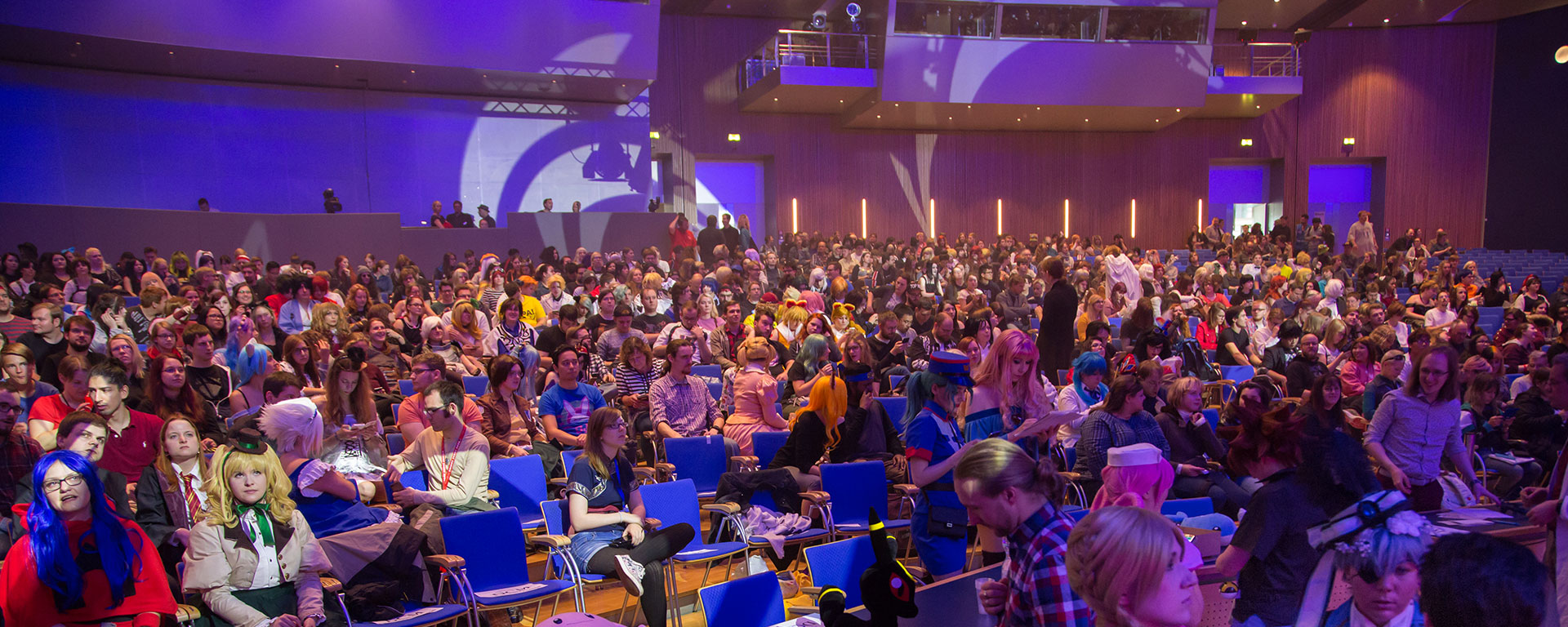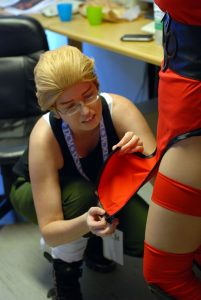Competitions are one of my favorite aspects of cosplay, and the highlight of many a convention. What better way to become your character than to portray them on the big stage in front of a fan audience? And what better way to measure your costume-making skills than presenting yourself to a panel of judges, along with dozens of other cosplayers?
If you’ve been thinking of entering a cosplay contest, but don’t quite know if you’re up to the challenge – this guide is for you! I’ll give you easy-to-follow tips for all aspects of a contest: from concept to the judging room or stage, and what to do after the curtain falls!
Find a contest for you

Almost every pop culture convention has a costume contest in some shape or form. Look up their homepage to learn about upcoming events at the con.
While there are some types of contest that allow you to register at the venue, for example hallway contests (where you’ll be judged on the convention floor and don’t have to prepare a performance or materials for the judges), most contests require you to register ahead of time. The more popular the event, the quicker the slots fill up, so it’s a good idea to follow the convention’s social media and prepare for the day the registration goes up.
Read the rules to learn what information the contest organizers need from you, and have it all ready when filling in the online registration form.
For competitive cosplayers, the Cosplay Contest Support Group on Facebook is a great place to learn about upcoming contests (mainly in North America) and to discuss different rating systems and exchange advice on how to compete.
If you think big and are interested in one of the many international cosplay competitions, they usually have their own homepage or social media page announcing the national qualifiers.
Looking for a convention near you? This list might be helpful!
For German-speaking countries, this list is more comprehensive.
Read the rules
Before you register for a contest, read the official rules and any information you can get about the contest and the venue where it takes place.
Find out what options and limitations the contest gives you.
Can you enter as a solo participant or as a group, and with how many people?
What type of costumes and characters are allowed? Some contests limit the source material you can use, for example, they will only allow characters from a Japanese anime / manga / video game or from a specific franchise like Star Wars. Some may allow original characters and designs, while others require that you hand in a reference image taken from an official source.
Can you enter with a purchased costume, or do you need to make your own from scratch? Is there a minimum requirement how much of your costume has to be self-made?
Does the contest place emphasis on craftsmanship, accuracy to the source material, or portrayal of the character? Rules often contain a list of criteria the judges will watch out for, and how many points or percentage can be awarded for each.
Will there be a separate craftsmanship judging? A walk-on presentation? A performance on stage? What is the time limit for each?
What materials are you expected to bring, and what kind of technical equipment can you expect on site? Make a note of all deadlines that apply! This is especially important for stage performances, since you may need to prepare an audio file with your own music and dialogue, sometimes even a video, and/or a light script with your instructions for the tech crew. The possibilities differ vastly from contest to contest, so much so that I’ve participated in a particular contest only because I wanted to stand on that awesome stage again!
If you have any questions regarding the rules and grading, don’t hesitate to contact the contest organizers before the event! If you come prepared, there will be fewer reasons to be nervous. It will also help you prevent a disappointment because the contest isn’t what you expected.
Pick a costume
Make sure your dream costume fits the rules of the contest (for example, the source material it’s from) and the grading system (emphasis on craftsmanship, accuracy, complexity…). Think about how well the judges can evaluate the quality of your work, and don’t make everyone’s job harder than it already is! Contest costumes that will be judged for accuracy need clear reference images.
Contests are a great way to challenge yourself and give you a level up! However, the costume should still match your skill set and the time frame. If in doubt, choose a costume that is less complex, but that you can realistically complete on time and with the attention to detail that will help you score points with the judges.
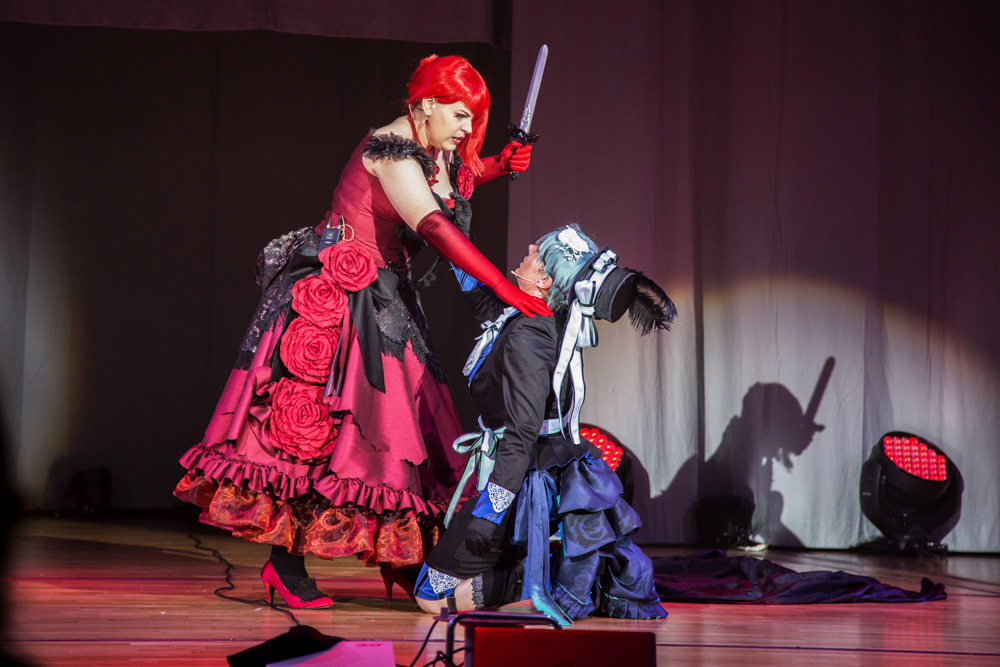
Always pick a character that you’ll be comfortable portraying on stage. That is especially true if the contest requires you to perform a skit, but it also really helps with a walk-on or even just presenting the costume in the judging room. Your accurate portrayal of the character, and the fact that you feel comfortable and confident in your costume, are all part of the overall impression that you make on the judges.
Have good reference images
Clear reference images are a huge plus because they help the judges decide whether you did a good job recreating the costume design.
Reference images should ideally show the character from all sides, from head to toe, and the colors and details should be as unambiguous as possible. If the costume changes from artwork to artwork, pick one image as your main reference and work from that.
When you’re doing an original design or making deliberate changes to the source material, be prepared to explain your design decisions to the judges. Do not attempt to edit the image to look more like your finished costume! This can get you disqualified and it’s a very unfair thing to do.
During judging, the judges will be able to view the reference images that you sent in and compare them to your costume. If you want to be safe, bring a high-quality printout and hand it to them in pre-judging. That way you can make sure the colors look right and you can show them all the detail shots that you want. It’s best to make a collage and put it all on one page.
Write a script
If the contest requires you to do some kind of performance on stage, you’ll want to write a detailed script that serves as a hand-holding guide for rehearsals. Don’t just include the dialogue: mark words that need extra emphasis, dramatic pauses, gestures that accompany your words, and any movement or action you do on stage. Note your cues and when the music changes. It helps me to briefly describe the mood of each scene in a headline.
The con may ask you to prepare a light and sound script for the tech crew. This script only needs to contain the essential cues: time code of your audio file, the desired light effect, what happens visibly on stage, and maybe a brief description of the music / audio for that part. Follow the con’s template if they have one.
Keep it simple
Judges can’t award points for the time it took you to make something, that simply wouldn’t be fair. They need to judge you by the end result instead.
Complexity and diversity of materials can be a huge plus, but you’ll want to make sure that you master each technique and execute it cleanly. It’s always sad when a costume looks impressive from a distance, but the details and finishing are sloppy. As a judge, I’ll award more points to someone who made what looks like a less complex costume, but did it perfectly.
Unsure whether a costume design is a good match for your budget and skill level? Check out this tutorial!
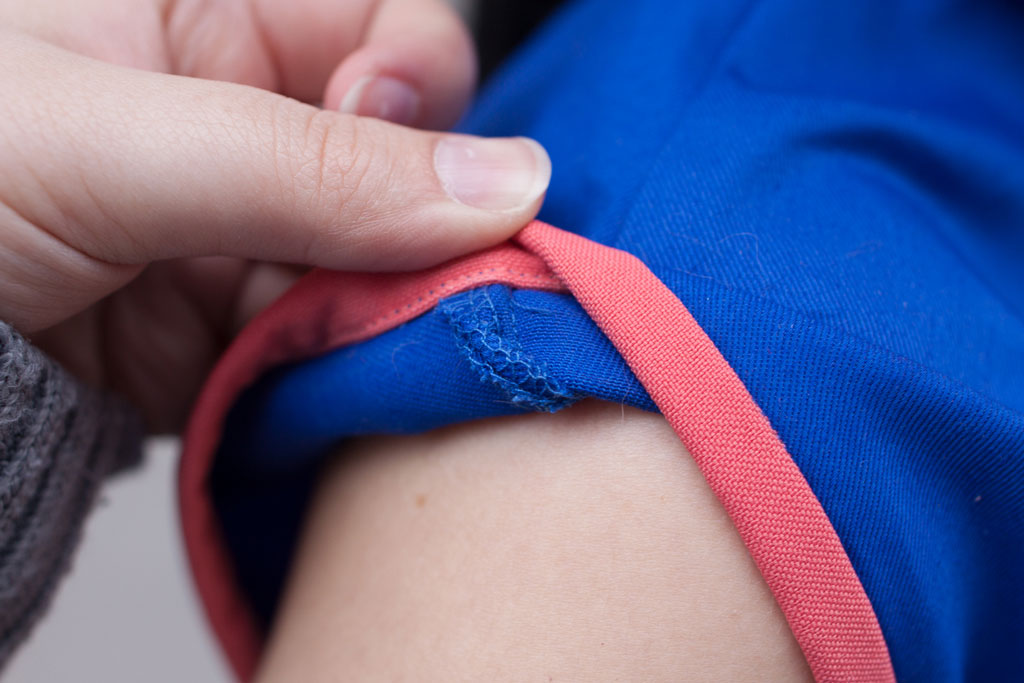
Don’t cram too many new techniques into a contest costume. Instead, show off what you’re good at! If you do want to learn something new, that’s great, but concentrate on one skill at a time. That way you’ll make fast progress on perfecting that skill or material.
The same is true for your stage performance: special effects (like interactive props or a costume change) can enhance your skit, but only if they’re executed flawlessly and don’t distract from your performance. It’s much more important to have good pacing, practice your body language, and tell a story that’s easily understandable – even if you stripped away the sound, light and prop effects.
Play to your strengths and do what you do well! If there’s something you’re really good at – be it dancing, stage combat, stand-up comedy, or prop-making – use that to your advantage! Likewise, if there’s something you suck at, keep that to a minimum and spend extra time practicing that part.
Practice, practice, practice
Rehearsals help reduce stress and make you feel more confident about your big day.
Practice putting on your make-up, wig and costume and assembling the stage props. Make a note how long it takes you to get dressed, and slap on a good 30 minutes just in case.
Craftsmanship judging
Practice what you’re going to tell the judges about your costume. You can start at the top (wig and make-up) and work your way down to the shoes. Time for craftsmanship judging is limited (usually less than 5 minutes) so you’ll want to give the judges enough time to ask questions and look at our costume up close.
Focus on the things that you’re most proud of, and that you think will net you the most points. Don’t point out mistakes you made, and do keep a friendly, positive attitude: the judges aren’t here to eat you or work against you!
Walk-on
Come up with a handful of different poses you can strike and hold for the judges and photographers, and practice moving in your costume. You should be „in character“ for the whole time you’re on stage, even when you’re transitioning from one pose to another, or walking on and off stage.
Skit
Practice your performance until you feel safe. Do rehearse your skit under realistic circumstances: find a space that’s big enough and mark the size of the stage. Turn up the volume on your music, speak up and overact so you’ll reach even the last person in the back of the room. Execute all of the movements like you would on stage and don’t just fake it.
Rehearse the skit in full costume to get used to it, or at least wear the parts that will restrict your movement: actual shoes, corset, long skirt, cape or wig, armor and prop weapons.
Record your performance on video or have a friend or relative watch it (the less they know about the character, the better!) to help you improve your acting and make sure the skit is easily understandable.
Time your movements to the music and build cues into the audio to help you. If you’re lip-synching the dialogue, practice until you’re perfectly in sync. Technical elements like these are something judges always watch out for, and they’re easy to get right with enough practice.
Depending on the contest rules, the performance part can be just as important as the actual costume – so don’t skimp on it!
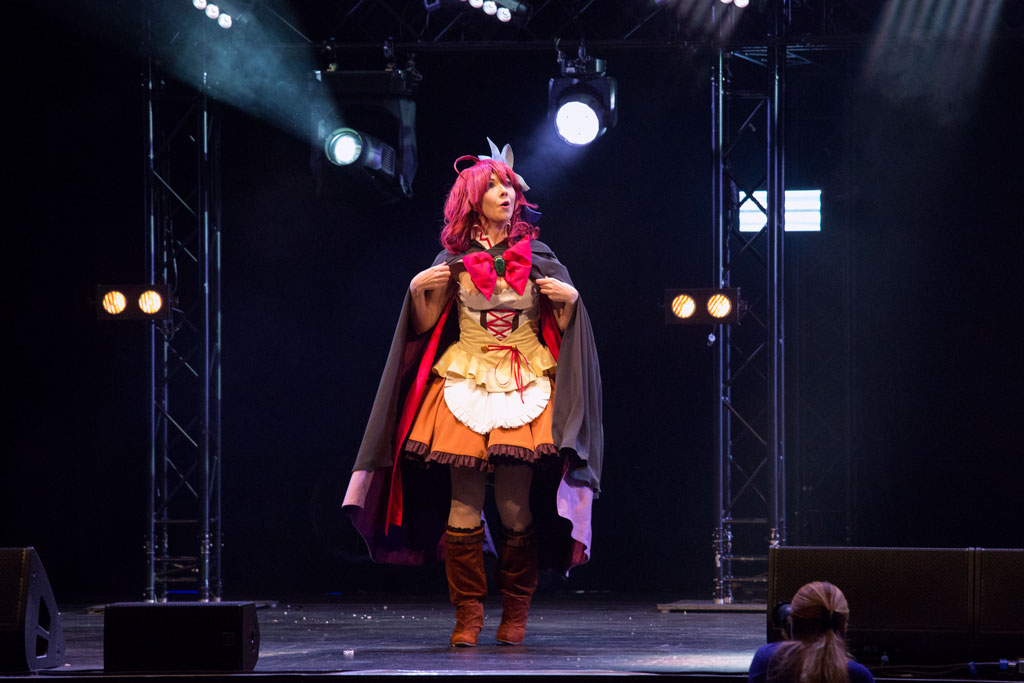
Come prepared
To avoid bad surprises, check the contest rules for deadlines: when do you need to hand in your reference image, audio file, etc. and in which format? When and where do you meet up at the con? Ask for clarification if the instructions you receive from the contest organizers are unclear or very late. Make sure to get their mobile number(s) for emergencies.
Take your audio file / background music with you so that you can listen to it again before the contest starts. Look for a quiet place to go over your script one last time, and practice in costume if you haven’t already. Some contests will allow you to rehearse on stage with actual sound and light effects, but don’t count on it! Make sure you have your skit or poses down to a T.
Make a checklist of all the items you need to bring – costume pieces, stage props, con pass and contact info, timetable, emergency repair kit, food, drink and medication.
It may sound banal but please don’t forget to hydrate and feed yourself at the con! Be at the stage in time and follow staff instructions to ensure that the show runs smoothly for everyone. Contests usually involve a lot of waiting, but can get very hectic all of a sudden, so it’s important that you find your mental „zone“ that will let you focus before you need to go on stage. Anything that helps you calm down and find that focus, take it with you – be it a physical item, a mental checklist or a positive thought.
If you need a handler to get into costume and to the venue, do make arrangements ahead of time. Enlisting a friend to help you behind the scenes (if allowed) is super helpful and you can always return the favor at the next con!
Enjoy yourself and make friends
Everyone is nervous before they go on stage, no matter whether they’re a noob or a pro. Remind yourself that you and the other cosplayers are in this together! Try not to stress out over little things, and show respect towards the others. Most cosplayers are super helpful behind the stage, and the Green Room is a great opportunity to make new friends!
If you find that one of your „opponents“ is making you nervous with their behavior, try to ignore them and look for the old-timers instead who keep calm and radiate confidence. Look out for yourself: if you feel dizzy or unwell because of nerves or a painful costume, immediately talk to a staff member or the next cosplayer near you.
Keep in mind that you’re all here to enjoy your hobby and put on a great show for the audience. Whoever wins the contest shouldn’t be the first thing on your mind when you go up on stage!
And what if something goes wrong? A prop breaks on stage, the audio is off, or you mix up your lines? Sh** happens! The audience probably won’t even notice your blooper, or if they do, they’ll have forgotten it in a few days’ time. Believe me when I say that you’ll laugh about your own mishaps next year!
In the moment, focus on delivering a great performance and pretend that nothing happened. Enjoy the atmosphere on stage and behind the scenes, and see it as a way to gain experience. The next time will be easier.
Give and ask for feedback
During craftsmanship judging, you may receive feedback from the judges on what they like about your costume, and what you could improve. You can always tell the judges that you don’t want to receive critique, but if the contest gives you the opportunity, I highly recommend that you take it! If they don’t give critique during the actual judging, you can usually contact the judges on social media later.
This is the best way to get honest critique from qualified cosplayers and artists, and it helps you improve your craftsmanship and presentation the next time around. As a judge, I always respond to requests for critique, and I’m careful to be constructive and point out the good as well.
Use the time behind the scenes to comment on other particpiants’ costumes and geek out about construction methods together. I learn a lot every time I take part in or judge a craftsmanship contest!
I feel super cringey watching myself on video, but I highly recommend watching your own stage performance if you can. Ask a friend to record it for you if you don’t want to search for it on YouTube later. Looking at your own work after a few days or weeks will help you realize your strengths and weaknesses, and both are important if you want to grow as an artist.
Be a good sport
The moment you step off stage, it’s finally done! Good job! After a long day probably filled with pre-judging and waiting for the show to start, you may feel like finally getting out of costume and taking a well-deserved break. However, don’t just run away after the show! Take a minute to say thank you to the staff who made this possible. Try to stay for the award ceremony, even if you don’t think you won anything.
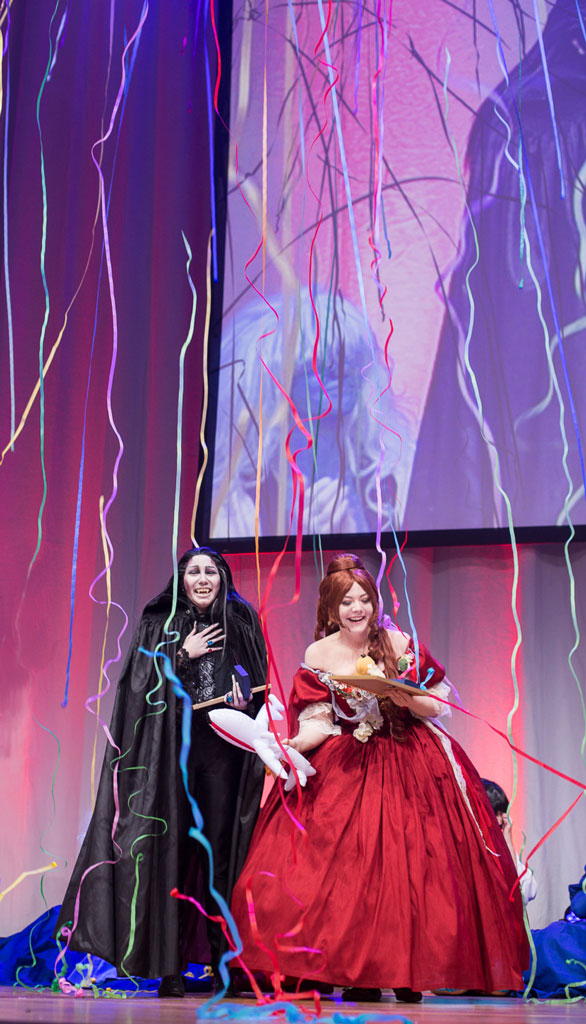
No matter the outcome of the contest: be a good winner or loser! Support the other cosplayers and respect their hard work. Don’t sulk during the award ceremony if you’re disappointed, and don’t gloat or come off as aloof if you won. Think about how you would feel if you were on the other side of the podium.
The judges have a tough job, and from my experience, they never make a light-hearted decision if the results are close. You’re entitled to have a different opinion than the judges, but do yourself a favor and keep that to yourself! If something really irks you about the result or the way the contest was run, at least wait a few days before you contact the organizers, and don’t go around bad-mouthing people on social media. That is never good form and it can get you a bad reputation with other events as well.
You are not a bad cosplayer if you don’t win an award. For me, a good cosplayer is someone who is passionate about what they do, and who is fair and supportive of other cosplayers.
